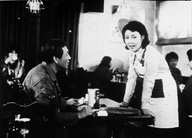Films from North Korea and the Chongryon Film Studio
A rarely shown collection of films from the Chongryon Film Studio, a film production linked closely with the history of the General Association of Korean Residents in Japan (Chongryon). It has bequeathed many films made for zainichi and cultivated exceptionally talented filmmakers, cinematographers and editors. Films will be screened along with one made in collaboration with North Korea.
Blooming Ethnic Education
(“Hana saku minzoku kyoiku”)JAPAN / 1974 / Korean / Color, B&W / 16mm / 85 min / Japanese subtitled version
Production, Source: Chongryon Film Studio
Uri hakkyo (our school) is what zainichi Korean comrades call ethnic schools. This film is a record of Korean schools across Japan that have worked to promote ethnic identity. Interspersed with old black and white footage, it depicts Chairman Kim Il-sung in his youth, scenes from the restoration of the homeland, and the progress of ethnic schools after liberation. The Chongryon Film Studio created many films on the theme of ethnic education. This particular version was produced in 1974.
Thinking about Ethnic Education: Second and Third-Generation Zainichi Korean Issues
(“Minzoku kyoiku o kangaeru: Zainichi Chosenjin no nisei sansei mondai”)JAPAN / 1976 / Japanese / B&W / 16mm / 30 min
Plannning, Production, Source: Chongryon Film Studio
This documentary is composed of a series of interviews with second and third-generation zainichi—Koreans who have been robbed of their speech, their writing and their names; and who live amidst discrimination and policies of assimilation. They tell of the contradictions of Japanese society, in which they have no opportunities to apply their college education or superior skills because of discriminatory hiring practices. Stitching together the voices of young people whose ethnic self-awareness has led them into various careers, students studying at Korea University in the suburbs of Tokyo, and families with children going to Korean schools, this film goes in search of the ideal position for Koreans living in a foreign land.
We Must Not Repeat the Past: On the 80th Anniversary of the Great Kanto Earthquake Korean Massacre
(“Rekishi o kurikaeshitewa naranai: Kanto daishinsai Chosenjin gyakusatsu hachiju shunen o mukaete”)JAPAN / 2003 / Japanese, Korean / Color / Video / 24 min
Production, Source: Chongryon Film Studio
After the Great Kanto Earthquake eighty years ago, an inhuman act occurred: groups of vigilantes captured Koreans and executed them. What is clear from this inspection of historical facts is that Japan is leaning toward the right, as seen in the passing of the Special Measures Law, a throwback to eighty years ago. Following the 2002 DPRK-Japan summit, anti-DPRK and anti-Chongryon riots broke out and the mass media circulated anti-Korean stories. Irritated by Japan’s refusal to atone for the past, this film calls for the building of a new future for DPRK-Japan relations based on an accurate understanding of history.
 A Silver Hairpin
A Silver Hairpin
(“Eunbineo”)- NORTH KOREA, JAPAN / 1985 / Korean / Color / 16mm (Original: 35mm) / 105 min
Directors: Ko Hak-rim, Ryo Un-gak, O Hon-rok, Kim Jong-chi, Ko Hwi-ung
Script: Kim Su-jung
Photography: Ri Hui-song, Kang Jong-gun, An Sung-min, Ri Yong-sik
Editing: Kim Kwang-ok, Che Myong-son, Ri Jol-ja
Sound: Che Kwang-muk
Music: So Jong-gon
Art Directors: Ryo Yong-gu, Han Tong-hwi
Lighting: Pak Un-hak, Jong Song-muk
Cast: So Kyong-sob, Hong Yong-hui, Kim Ok-hui, Kim Ju-ok, Mun Yae-bong, Kim Se-yong
Producer: Kim Do-gon
Production Companies: Korean Art Film Studio, Samjiyon Creative Group, Chongryon Film Studio
Source: Chongryon Film Studio
Chongryon Film Studio made this film with the DPRK Film Production Group, which visited Japan from February to March of 1985, to commemorate the thirtieth anniversary of the formation of the General Association of Korean Residents in Japan (Chongryon). The main character, a certain branch office head for the newspaper The Choson Sinbo, has spent twenty years praying for the reunification of his fatherland and devoting himself to patriotic activities at Chongryon. Suggested by the friction in the relationship between his dutiful daughter and her boyfriend, the film depicts one family’s troubled history and their passionate love for the fatherland. The film also offers enjoyable directorial touches, such as frequent interludes of beautiful music.
 Snow Melts in Spring (a.k.a. Thaw)
Snow Melts in Spring (a.k.a. Thaw)
(“Bomnalui nunseogi”)- NORTH KOREA, JAPAN / 1985 / Korean / Color / Video (Original: 35mm) / 100 min
Directors: Rim Chang-bom, Ko Hak-rim
Script: Ri Chun-gu
Photography: Kwak Chol-sam, Ri Hui-song
Editing: Kim Yong-sil
Sound: Che Kwang-muk
Art Director: Ryo Yong-gu
Music: Kim Kon-il
Cast: Kim Ryong-rin, Kim Jun-sik, So Kyong-sob, Kim Yong-sik, Jo Ji-sun, An Su-bok
Production Companies: Korean Art Film Studio, Chongryon Film Studio
Source: Chongryon Film Studio
A novelty among North Korean films, this is a love story shot extensively in Japan. The partition dividing the home country creates a major obstacle to the marriage of a young woman whose father is a member of Mindan (Korean Residents Union in Japan) and a young man hemmed in by his Chongryon family. Set against the historical background of forced labor under colonial rule, the film depicts the hardships of Koreans living in contemporary Japan and finally suggests the thawing of relations between North and South with a happy ending in which the two lovers are wed. Snow Melts in Spring was also apparently intended for overseas release, having received the main prize at the Karlovy Vary International Film Festival. It was also shown recently at the Pusan International Film Festival.